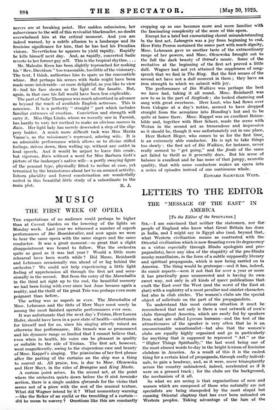MUSIC THE FIRST WEEK OF OPERA
THE expectations of no audience could perhaps be higher than at Covent Garden on the lowering of the lights on Monday week. Last year we witnessed a number of superb performances of Der Rosenkacalier, and now again we were to hear the same opera with the same singers and the same conductor. It was a great moment—so great that a slight disappointment was bound to follow. Was the orchestra quite as good as it was last year ? Would a little more rehearsal have been worth while ? Did Mmes. Reinhardt and Lehmann occasionally run ahead of or lag behind the orchestra ? We could not help experiencing a little light feeling of apprehension all through the first act and occa- sionally in the second. But from the entry of the Marschallin in the third act right up to the end, the beautiful memory we had been living with ever since last June became again a reality, and the thrill of the great Trio was perhaps even more poignant than before.
The acting was as superb as ever. The Marschallin of Mine. Lehmann and the Ochs of Herr Mayr must surely be among the most finished operatic performances ever seen.
It was unfortunate that the next day's Tristan, Herr Lorenz Hofer, should have been in a poor state of health—unfortunate for himself and for us, since his singing utterly ruined an otherwise fine performance. His tremolo was so pronounced and his dynamic range so limited that I cannot believe that, even when in health, his voice can be pleasant in quality or suitable to the role of Tristan. The first act, however, went magnificently, owing to the stupendous ease and beauty of Mine. Kappel's singing. The pianissimo of her first phrase after the parting of the curtains on the ship was a thing to marvel at. All praise, too, is due to Mme. Olczewska and Herr Mayr, in the roles of Brangdne and King Marke.
A curious point arises. In the second act, at the point where the orchestra quiets down before the 0 sink liernieder section,. there is a single sudden sforzando for the violas that seems not of a piece with the rest of the musical texture. What did Wagner intend by it ? What momentary warning —like the flicker of an eyelid or the trembling of a curtain— did he mean to convey ? Questions like this are constantly cropping up as one becomes more and more familiar with the fascinating complexity of the score of this opera.
Except for a brief but excruciating choral misunderstanding In the first act, Lohengrin was a joy from beginning to end. Herr Fritz Perron sustained the name part with much dignity, Mine. Lehmann gave us another taste of the extraordinary range of her powers, and Mme. Olczewska brought out to the full the dark beauty of Ortrud's music. Some of the recitative at the beginning of the first act proved a little dull. Wagner had not yet attained the suppleness of song- speech that we find in The Ring. But the first scenes of the second act have not a dull moment in them ; they have an iron strength to which we submit with joy.
The performance of Die Walkiire was perhaps the best we have had, taking it all round. Mme. Reinhardt was new to us in the part of Sieglinde ; she looked charming and sang with great sweetness. Herr Loot, who had flown over from Cologne at a day's notice, seemed to have dropped straight from the aeroplane into Hunding's but and to be quite at home there. Mme. Kappel was an excellent Briinn- hilde and, together with Herr Schorr, made the scene with Wotan in the second act as tremendous and impressive as it should be, though it was unfortunately cut in one place.
Herr Robert Heger, who comes to us for the first time, is an extremely able conductor. He is apt to take things too slowly : the first act of Die Walkiire, for instance, never really seemed to " get going," and the finale of the same act failed to thrill as it generally does. But his sense of balance is excellent and he has none of that jumpy, neurotic quality, that with some conductors makes an opera into a series of episodes instead of one continuous whole.
EDWARD SACRVD-LE WEST.










































 Previous page
Previous page